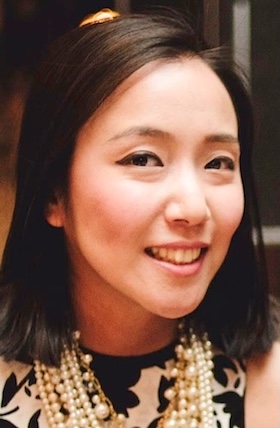National President Larry Oda touts
Saki Mori’s wealth of knowledge, experience.
By P.C. Staff

Mori
Japanese American Citizens League National President Larry Oda on Sept. 15 revealed the identity of the person who has been hired to serve in the capacity of interim executive director of the civil rights organization.
“It gives me great pleasure in announcing that Saki Mori has accepted the position of JACL interim executive director to start on Sept. 15, 2025,” said Oda.
The development follows the departure of David Inoue, who served as the organization’s executive director from 2017 until July 2. (July 4, 2025 Pacific Citizen, tinyurl.com/3adamehf)
In a statement to the Pacific Citizen, Mori said, “I look forward to working with the National Board and staff to continue the organization’s work and build the organization’s capacity to continue its mission.”
Mori’s history with JACL includes serving as president of the New York JACL chapter and vp for membership under Jeffrey Moy, who preceded Oda as the civil rights organization’s national board president. In 2019, she participated in the annual JACL-OCA Leadership Summit. It was there where Mori said that she “saw first-hand the national scope of JACL’s history, work and impact.”
Prior to accepting the interim ED role with JACL, the New York City-based Mori, who earned her bachelor’s degree in political science (international relations) and French language and literature from Trinity College in 2005 and describes herself as a Shin-Nisei, most recently served as the director of special projects at the consulting firm Perch Advisors LLC, where she supported nonprofit clients with program management, grants management and workforce development.
“She brings a wealth of knowledge and experience in organizational development and fundraising,” Oda added. “We look forward to her leadership.”
Reflecting on the challenges she will face as JACL’s interim executive director, Mori said, “I am now entrusted to serve the JACL at a time of transition when the organization and its partners are on the front lines to protect our communities.
“I am responsible for ensuring the organization’s continuity of operations for its programs and services,” she continued. “However, there is a greater responsibility currently, and JACL’s commitment to and work on civil rights, social justice and civic engagement is needed now more than ever by our members, chapters, partners and communities across the country.”
Mori’s hiring comes as the organization, which describes itself as the nation’s oldest and largest Asian American civil rights organization, faces several challenges.
One such challenge is declining membership, which was just below 9,000 members in 2017 to just below 7,000 in 2025. Another is a large budget deficit, which earlier this year led to staffing cuts and pay reductions for remaining staff.
It also remains to be seen whether JACL has overcome the problem it faced in 2022 — a biennial election year for board officers — when no one ran for any office, including that of national president until Oda, who had served as JACL national president from 2006-10 in two back-to-back biennial terms, entered the race at the last moment.
Another looming milestone and potential opportunity for the organization, which led the drive to win redress in 1988 for Japanese Americans incarcerated by the federal government during WWII, is its centennial in 2029.
(Following is a Q&A between Pacific Citizen and Saki Mori that was conducted via email.)
The Pacific Citizen: Why did you decide to accept this role?
Saki Mori: I accepted this role because I believe I possess the skills and experience that JACL is seeking now to support the board and staff during a time of leadership transition. As a member, former National Board member and chapter leader, I already have the institutional knowledge of the organization that gives me a running start to work on organizing priorities and supporting the staff with their roles, responsibilities and programs to maintain operations.
The P.C.: What are your greatest strengths that you’ll be bringing to this role, and what are areas that you feel you will need to bolster?
Mori: My career in nonprofits, ranging from direct service to executive management, is grounded in organized and responsive organizational management that takes into consideration day-to-day operations, program planning and management, grants management and funder deliverables and organizational budget and administrative management.
I am keen on understanding what’s working, what are challenges, where improvements can be made and providing space for new ideas, approaches and strategies to inform the organization and its programs.
Although, the board and staff have been very frank and open about the challenges and the work that needs to take place, I will only truly know the work ahead once I start the job. Whether if it’s an immediate priority to something that is running well with the organization, I will conduct additional assessments with the staff and board and lean on the staff for their perspective and guidance for addressing priorities.
The P.C.: Will you be applying for the permanent JACL executive director position?
Mori: Pursuing the permanent role will depend on a few factors for me, including location. For this interim capacity, I will work remotely. At this time, the permanent role requires the position to be based in San Francisco or Washington, D.C., and for me, personally, a move is not an easy decision to take lightly.
The P.C.: Understanding that serving as “interim executive director” is by definition temporary, what is your commitment to serving in this interim capacity? What is the difference from your perspective on the role of interim ED vs. serving as the permanent ED?
Mori: I will work in a full-time capacity for this role and will take on most of the roles and responsibilities required of an executive director. The main responsibility is to maintain the continuity of operations for the organization as it seeks a permanent hire. Thus, I won’t necessarily be able to initiate work and projects that would be considered long-term.
Once a permanent hire starts, the person in the role will set out their own agenda, vision and strategies for near- and long-terms. This doesn’t necessarily preclude me from leading projects that would take time to plan and execute; however, the work will have to be very focused and discrete in its planning, goals, execution and timeline.
The P.C.: You have previously served as vp of membership on the JACL National Board, and right now, JACL’s membership is slightly below 7,000. What are your thoughts on how the organization can increase its membership, and how quickly? In addition, what is the value proposition of being a JACL member in 2025 and beyond?
Mori: I’m looking forward to returning to the work on membership for the organization and working together with Dominique Mashburn, vp of membership, and Ariel Imamoto, membership manager, to determine ways to address the immediate needs to build up membership and initiate work to develop strategies on membership recruitment and retention.
Right now, our Japanese American community and communities across the country are looking for organizations like ours that provide community, learning/education, taking action and more. In this near term, we need to maximize on this need and figure out how to ramp up our outreach and visibility, so that people can attend our events, access our resources (such as the Pacific Citizen archives!) and connect with our members.
For the long-term, we need to critically examine our membership development and take an inventory on what attracts people to join, what programs are relevant and impactful for our members and what are activities that interest our membership that we’re not offering.
Ultimately, I believe that establishing a comprehensive and thoughtful membership recruitment and retention strategy that can be feasible for both national and our chapters to implement can stabilize the organization’s membership numbers and provide a healthy foundation to grow and sustain our membership. Both for the near- and long-term, we also need to understand the true capacity and resources (people power, time and funding) needed to drive and sustain the membership base that we are seeking to establish.
The P.C.: What do you think is the role of the Pacific Citizen as an asset to help JACL raise its profile and grow the organization?
Mori: The Pacific Citizen has a significant and instrumental role to support JACL in how it carries its mission and serves its members and chapters. Overall, I would like to help establish a more coordinated structure with organizational communications so that information and updates can optimize responsiveness, outreach and awareness to the JACL community.
The Pacific Citizen is a critical asset where the voices of our membership and community have a platform to exercise our civil rights and demonstrate civic engagement. I’m excited to work with the Pacific Citizen team to strengthen their work and identify opportunities to maintain its mission and grow their visibility.



